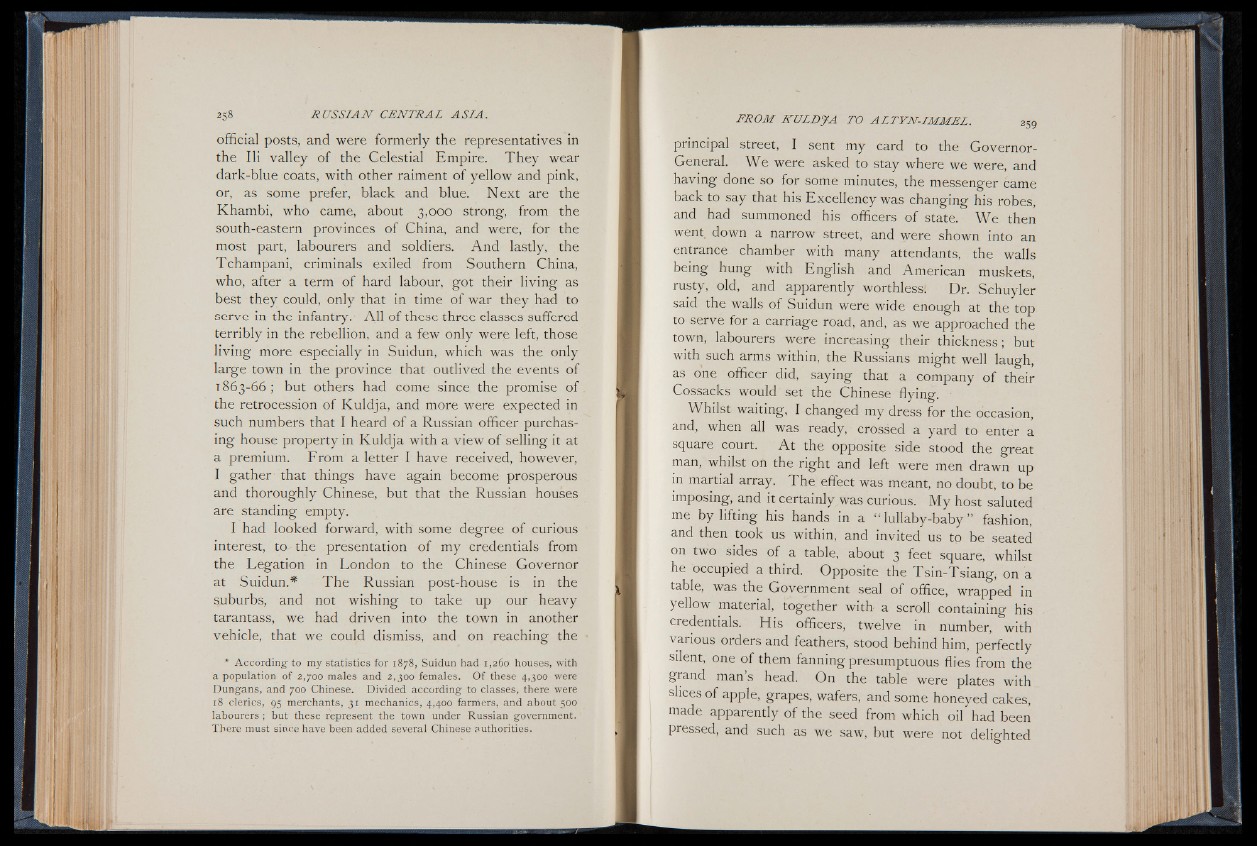
official posts, and were formerly the representatives in
the Hi valley of the Celestial Empire. They wear
dark-blue coats, with other raiment of yellow and pink,
or, as some prefer, black and blue. Next are the
Khambi, who came, about 3,000 strong, from the
south-eastern provinces of China, and were, for the
most part, labourers and soldiers. And lastly, the
Tchampani, criminals exiled from Southern China,
who, after a term of hard labour, got their living as
best they could, only that in time of war they had to
serve in the infantry. All of these three classes suffered
terribly in the rebellion, and a few only were left, those
living more especially in Suidun, which was the only
large town in the province that outlived the events of
1863-66 ; but others had come since the promise of
the retrocession of Kuldja, and more were expected in
such numbers that I heard of a Russian officer purchasing
house property in Kuldja with a view of selling it at
a premium. From a letter I have received, however,
I gather that things have again become prosperous
and thoroughly Chinese, but that the Russian houses
are standing empty.
I had looked forward, with some degree of curious
interest, to- the presentation of my credentials from
the Legation in London to the Chinese Governor
at Suidun.* The Russian post-house is in the
suburbs, and not wishing to take up our heavy
tarantass, we had driven into the town in another
vehicle, that we could dismiss, and on reaching the
* According- to my statistics for 1878, Suidun had 1,260 houses, with
a population of 2,700 males and 2,300 females. Of these 4,300 were
Dungans, and 700 Chinese. Divided according to classes, there were
18 clerics, 95 merchants, 31 mechanics, 4,400 farmers, and about 500
labourers ; but these represent the town under Russian government.
There must since have been added several Chinese authorities.
principal street, I sent my card to the Governor-
General. We were asked to stay where we were, and
having done so for some minutes, the messenger came
back to say that his Excellency was changing his robes,
and had summoned his officers of state. We then
went, down a narrow street, and were shown into an
entrance chamber with many attendants, the walls
being hung with English and American muskets,
rusty, old, and apparently worthless-: Dr. Schuyler
said the walls of Suidun were wide enough at the top
to serve for a carriage road, and, as we approached the
town, labourers were increasing their thickness; but
with such arms within, the Russians might well laugh,
as one officer did, saying that a company of their
Cossacks would set the Chinese flying.
Whilst waiting, I changed my dress for the occasion,
and, when all was ready, crossed a yard to enter a
square court. A t the opposite side stood the great
man, whilst on the right and left were men drawn up
in martial array. The effect was meant, no doubt, to be
imposing, and it certainly was curious. My host saluted
me by lifting his hands in a “ lullaby-baby” fashion,
and then took us within, and invited us to be seated
on two sides of a table, about 3 feet square, whilst
he occupied a third. Opposite the Tsin-Tsiang, on a
table, was the Government seal of office, wrapped in
yellow material, together with a scroll containing his
credentials. His officers, twelve in number, with
various orders and feathers, stood behind him, perfectly
silent, one of them fanning presumptuous flies from the
grand man s head. On the table were plates with
slices of apple, grapes, wafers, and some honeyed cakes,
made apparently of the seed from which oil had been
pressed, and such as we saw, but were not delighted